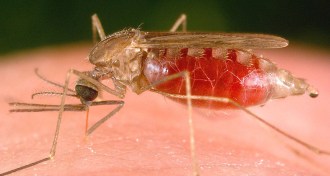Humans
Sign up for our newsletter
We summarize the week's scientific breakthroughs every Thursday.
-
 Psychology
PsychologyHighlights from the American Sociological Association annual meeting
Research on social media's reluctant users, marital ideals and single parenthood and intimate victims of cybernastiness presented August 10-13 in New York City.
By Bruce Bower -
 Health & Medicine
Health & MedicineClues emerge to explain allergic asthma
Tests in mice reveal that allergens can trigger inflammation by cleaving a clotting protein.
By Nathan Seppa -
 Health & Medicine
Health & MedicineGut-brain communication failure may spur overeating
Restoring a depleted molecule in obese mice repaired their abnormal response to food.
-
 Psychology
PsychologyMental disorder seen as ‘badness, not sickness’
Health workers tend to consider borderline personality disorder a tag for patients who are difficult or impossible to treat.
By Bruce Bower -
 Health & Medicine
Health & MedicineRacial homogeneity in early childhood may affect brain
In lab study, kids who lived in single-race orphanages have difficulty interpreting emotions on faces with foreign features.
-
 Health & Medicine
Health & MedicineMediterranean diet may offset genetic risk for stroke
Compared to a low-fat diet, eating fish and olive oil kept blood sugar levels lower in people with a common diabetes risk factor.
-
 Psychology
PsychologyRatio for a good life exposed as ‘nonsense’
A heralded calculation of people’s ability to flourish is a mathematical mirage, researchers say.
By Bruce Bower -
 Humans
HumansDNA reveals details of the peopling of the Americas
Migrants came in three distinct waves that interbred once in the New World.
-
 Tech
TechOnline ‘likes’ multiply themselves
Social media users swayed by previous ratings, researchers find when they randomly assign positive and negative votes.
-
 Health & Medicine
Health & MedicineCamels implicated as possible hosts of MERS virus
Antibodies to a mysterious pathogen that has sickened 94 people were found in camels in Oman and the Canary Islands.
-
 Health & Medicine
Health & MedicineVaccine protects against malaria in early test
A series of shots enables volunteers to fend off a live infection by the disease-causing parasite.
By Nathan Seppa -
 Health & Medicine
Health & MedicineHigh blood glucose levels linked to dementia
Elderly people with elevated blood glucose levels are more apt to develop dementia, whether or not they have diabetes.
By Nathan Seppa